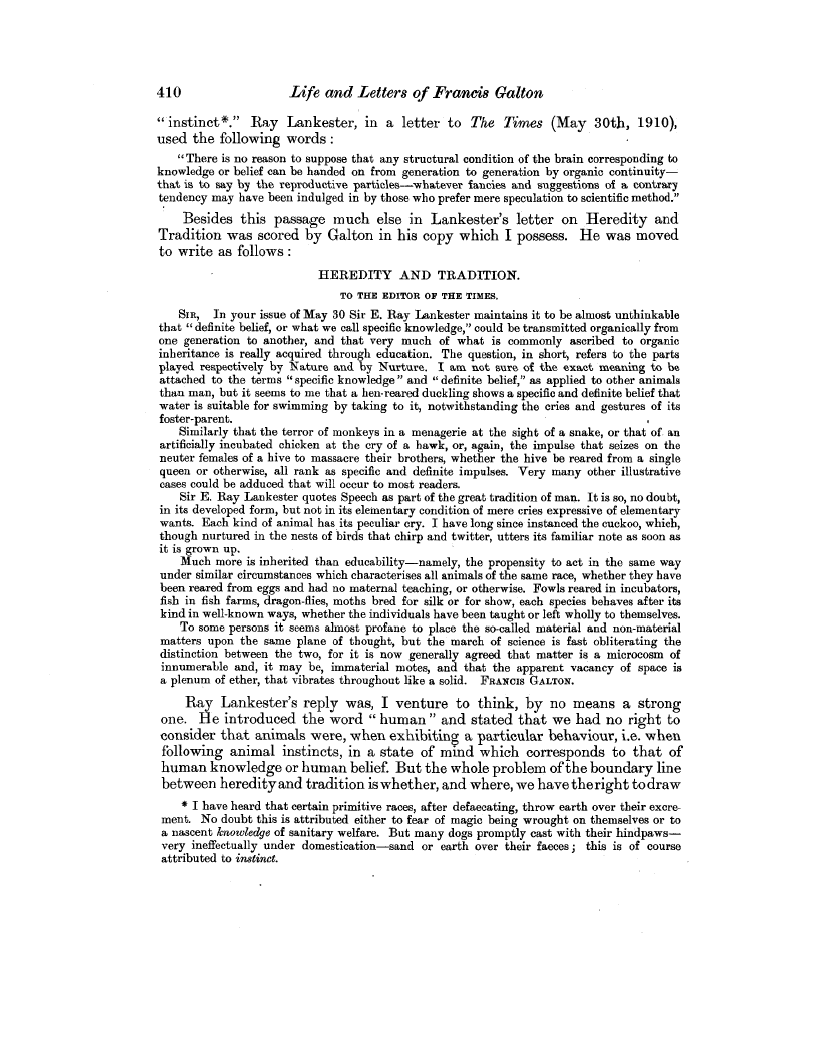| ||||||

OCR Rendition - approximate
410 Life and Letters of Francis Galton "instinct*." Ray Lankester, in a letter to The Times (May 30th, 1910), used the following words "There is no reason to suppose that any structural condition of the brain corresponding to knowledge or belief can be handed on from generation to generation by organic continuitythat is to say by the reproductive particles-whatever fancies and suggestions of a contrary tendency may have been indulged in by those who prefer mere speculation to scientific method." Besides this passage much else in Lankester's letter on Heredity and Tradition was scored by Galton in his copy which I possess. He was moved to write as follows HEREDITY AND TRADITION. TO THE EDITOR OF THE TIMES. SIR, In your issue of May 30 Sir E. Ray Lankester maintains it to be almost unthinkable that "definite belief, or what we call specific knowledge," could be transmitted organically from one generation to another, and that very much of what is commonly ascribed to organic inheritance is really acquired through education. The question, in short, refers to the parts played respectively by Nature and by Nurture. I am not sure of the exact meaning to be attached to the terms "specific knowledge" and "definite belief," as applied to other animals than man, but it seems to me that a hen-reared duckling shows a specific and definite belief that water is suitable for swimming by taking to it, notwithstanding the cries and gestures of its foster-parent. Similarly that the terror of monkeys in a menagerie at the sight of a snake, or that of an artificially incubated chicken at the cry of a hawk, or, again, the impulse that seizes on the neuter females of a hive to massacre their brothers, whether the hive be reared from a single queen or otherwise, all rank as specific and definite impulses. Very many other illustrative cases could be adduced that will occur to most readers. Sir E. Ray Lankester quotes Speech as part of the great tradition of man. It is so, no doubt, in its developed form, but not in its elementary condition of mere cries expressive of elementary wants. Each kind of animal has its peculiar cry. I have long since instanced the cuckoo, which, though nurtured in the nests of birds that chirp and twitter, utters its familiar note as soon as it is grown up. Much more is inherited than educability-namely, the propensity to act in the same way under similar circumstances which characterises all animals of the same race, whether they have been reared from eggs and had no maternal teaching, or otherwise. Fowls reared in incubators, fish in fish farms, dragon-flies, moths bred for silk or for show, each species behaves after its kind in well-known ways, whether the individuals have been taught or left wholly to themselves. To some persons it seems almost profane to place the so-called material and non-material matters upon the same plane of thought, but the march of science is fast obliterating the distinction between the two, for it is now generally agreed that matter is a microcosm of innumerable and, it may be, immaterial motes, and that the apparent vacancy of space is a plenum of ether, that vibrates throughout like a solid. FRANCIS GALTON. Ray Lankester's reply was, I venture to think, by no means a strong one. He introduced the word " human " and stated that we had no right to consider that animals were, when exhibiting a particular behaviour, i.e. when following animal instincts, in a state of mind which corresponds to that of human knowledge or human belief. But the whole problem of the boundary line between heredity and tradition is whether, and where, we have theright to draw * I have heard that certain primitive races, after defaecating, throw earth over their excrement. No doubt this is attributed either to fear of magic being wrought on themselves or to a nascent knowledge of sanitary welfare. But many dogs promptly cast with their hindpawsvery ineffectually under domestication-sand or earth over their faeces; this is of course attributed to instinct.
|